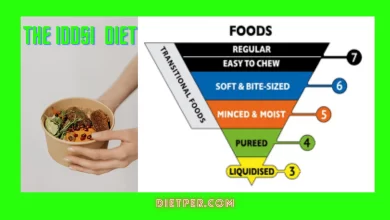Empower Your Health: 7-Day GERD Diet Plan for Symptom Relief
Relieve GERD Symptoms: Your 7 day Gerd diet plan

7 Day Gerd Diet Plan :- Gastroesophageal reflux disease (GERD) is a chronic digestive disorder that affects millions of people worldwide. GERD is caused by the stomach’s acid flowing back into the esophagus, causing heartburn, acid reflux, and other uncomfortable symptoms. While medication can help manage GERD, dietary changes can also help relieve symptoms and improve overall digestive health.
What Do You Mean By Gerd?
GERD, commonly known as Gastroesophageal Reflux Disease, is a chronic digestive disorder that affects millions of people worldwide. It occurs when the stomach acid or bile flows back into the esophagus, causing irritation and inflammation. This condition can lead to various uncomfortable symptoms, such as heartburn, regurgitation, chest pain, and difficulty swallowing.
GERD is often triggered by certain lifestyle factors, such as being overweight or obese, smoking, consuming acidic or spicy foods, and lying down immediately after meals. Understanding the causes and symptoms of GERD is crucial in managing and relieving its symptoms effectively. When you experience GERD symptoms, you must make necessary dietary adjustments to alleviate discomfort.
A well-planned diet can play a significant role in managing GERD symptoms and promoting overall digestive health. You can relieve symptoms and improve your quality of life by eliminating trigger foods and incorporating foods that reduce acidity and inflammation. Creating a specialized meal plan for GERD can be challenging, but you can effectively manage your symptoms with the right guidance and a comprehensive understanding of what to eat and avoid.
Why do you need a GERD diet plan?
If you suffer from GERD, you know how challenging it can be to manage the symptoms and find relief. This is where a GERD diet plan comes into play. It is a specialized eating plan designed to alleviate the symptoms of GERD and promote digestive health.
7 Reasons Why You Need a 7 Day GERD Diet Plan Living with GERD
The chronic symptoms of heartburn, acid reflux, and indigestion can greatly impact your quality of life. While medications can provide temporary relief, managing your symptoms and preventing flare-ups requires a more holistic approach. This is where a 7 Day GERD diet plan becomes essential.
1. Minimize Symptoms: A well-planned diet customized to address GERD can effectively reduce the frequency and severity of symptoms. Avoiding trigger foods and incorporating healing foods can alleviate the discomfort associated with acid reflux.
2. Reduce Acid Reflux Episodes: Acid reflux occurs when stomach acid flows back into the esophagus. A GERD diet plan aims to minimize the occurrence of these episodes by promoting better digestion and preventing excessive acid production.
3. Promote Digestive Health: Certain foods can exacerbate GERD symptoms by stimulating excess acid production or causing irritation in the digestive system. A well-balanced diet plan focuses on foods that promote healthy digestion, reducing the risk of acid reflux and other related issues.
4. Weight Management: Maintaining a healthy weight is crucial for managing GERD. Excess weight puts pressure on the stomach, increasing the likelihood of acid reflux. A targeted diet plan can help you achieve and maintain a healthy weight, reducing the risk of GERD symptoms.
5. Improve Nutritional Intake: Following a GERD diet plan will encourage you to consume nutrient-rich foods that support overall health. By incorporating a variety of fruits, vegetables, whole grains, and lean proteins, you’ll ensure you’re getting the necessary nutrients while minimizing triggers for acid reflux.
6. Enhance Sleep Quality: Nighttime acid reflux can disrupt sleep, leaving you tired and groggy the next day. A GERD diet plan typically includes guidelines on meal timing and the types of foods to avoid before bedtime, helping to promote better sleep and overall well-being.
7. Long-Term Management: GERD is a chronic condition that requires ongoing management. By adopting a GERD diet plan as part of your lifestyle, you can establish healthy eating habits that will keep symptoms under control in the long run, reducing the need for excessive medication use.
6 Significant symptoms of 7 Day GERD Diet Plan
GERD, also known as Gastroesophageal Reflux Disease, is a common digestive disorder that affects millions of people worldwide. Understanding the symptoms of GERD is crucial in diagnosing and treating this condition. If you experience any of the following symptoms, it is important to consult with a healthcare professional for an accurate diagnosis.
1. Heartburn: One of the most common symptoms of GERD is a burning sensation in the chest, known as heartburn. This discomfort is often felt after eating, especially when lying down or bending over.
2. Regurgitation: GERD can cause the stomach contents, including stomach acid, to flow back into the esophagus, resulting in a sour or bitter taste in the mouth. This regurgitation can also lead to a persistent cough or hoarseness.
3. Difficulty Swallowing: Also known as dysphagia, difficulty swallowing can be a symptom of GERD. This can occur when the esophagus becomes inflamed or narrowed due to repeated exposure to stomach acid.
4. Chest Pain: GERD can sometimes cause chest pain that may mimic a heart attack. This pain can be sharp, squeezing, or burning, and it is essential to seek immediate medical attention if you experience chest pain to rule out any serious conditions.
5. Chronic Cough: If you have a persistent cough that doesn’t seem to go away, it could be a symptom of GERD. This occurs when stomach acid irritates the throat and causes coughing.
6. Laryngitis: GERD can also affect the voice box, leading to laryngitis. Symptoms may include a hoarse voice, frequent throat clearing, or a persistent sore throat. It’s important to note that individuals may experience different combinations of these symptoms, and not everyone with GERD will have all the symptoms listed.
3 most important Causes Of 7 Day GERD Diet Plan
GERD occurs when the lower esophageal sphincter (LES) becomes weakened or relaxed, allowing stomach acid to flow back into the esophagus. While various factors can contribute to GERD, three key causes are particularly important to understand.
1. Diet: One of the primary causes of GERD is an unhealthy diet. Consuming foods that are high in fat, spice, or acidity can trigger the symptoms of GERD. Fried and fatty foods, citrus fruits, tomatoes, chocolate, caffeine, and alcohol are common culprits. These types of foods can weaken the LES and lead to acid reflux. It is vital to identify trigger foods and avoid them to minimize GERD symptoms.
2. Obesity: Another significant cause of GERD is obesity. Excess weight places pressure on the abdomen, forcing stomach acid to flow back into the esophagus. Additionally, fat deposits around the abdomen can affect the functioning of the LES, leading to acid reflux. Losing weight through a balanced diet and regular exercise can help alleviate GERD symptoms in obese individuals.
3. Hiatal Hernia: A hiatal hernia occurs when a portion of the stomach pushes through the diaphragm and into the chest cavity. This condition can weaken the LES and disrupt the normal flow of stomach acid. Hiatal hernias can be congenital or develop over time due to age, obesity, or frequent heavy lifting. Patients with hiatal hernias are more susceptible to GERD and may experience more severe symptoms.
Sample 7 day GERD diet plan with Indian diet
If you’re someone who suffers from GERD (Gastroesophageal Reflux Disease), you know how important it is to manage your diet to find relief from the uncomfortable symptoms. We have created a 7-day meal plan to relieve GERD symptoms and promote better digestive health.
Day 1
- – Breakfast: Start your day with a delicious bowl of oatmeal topped with sliced bananas and a drizzle of honey.
- – Lunch: Enjoy a grilled chicken salad with mixed greens, cherry tomatoes, cucumber, and a light vinaigrette dressing.
- – Snack: Munch on a handful of almonds for a healthy and satisfying mid-day snack.
- – Dinner: Savor a grilled salmon fillet with steamed asparagus and quinoa on the side.
- – Dessert: Treat yourself to a refreshing bowl of mixed berries.
Day 2
- – Breakfast: Enjoy a yogurt parfait with Greek yogurt, granola, and fresh berries.
- – Lunch: Have a turkey wrap with whole wheat tortilla, lettuce, tomatoes, and a hummus spread.
- – Snack: Indulge in a sliced apple with a dollop of almond butter.
- – Dinner: Delight in a vegetarian stir-fry with tofu, bell peppers, broccoli, and brown rice.
- – Dessert: Satisfy your sweet tooth with a small piece of dark chocolate.
Day 3
- – Breakfast: Fuel your morning with a veggie omelet made with bell peppers, spinach, and feta cheese.
- – Lunch: Enjoy a Mediterranean-inspired salad with grilled chicken, cherry tomatoes, olives, and a light lemon vinaigrette.
- – Snack: Munch on carrot sticks with a side of hummus.
- – Dinner: Relish a lean beef stir-fry with snap peas, mushrooms, and cauliflower rice.
- – Dessert: Treat yourself to a homemade fruit smoothie with a blend of your favorite fruits.
Day 4
- – Breakfast: Start your day with a bowl of whole-grain cereal topped with sliced peaches and a sprinkle of chia seeds.
- – Lunch: Delight in a grilled shrimp salad with mixed greens, avocado, cherry tomatoes, and a tangy citrus dressing.
- – Snack: Enjoy a few grapes for a refreshing and light snack.
- – Dinner: Savor a roasted chicken breast with roasted vegetables like zucchini, bell peppers, and sweet potatoes.
- – Dessert: Indulge in a small portion of low-fat frozen yogurt with your favorite toppings.
Day 5
- – Breakfast: Have a whole wheat bagel with smoked salmon, cream cheese, and fresh dill.
- – Lunch: Enjoy a quinoa and black bean salad with diced tomatoes, corn, and a squeeze of lime juice.
- – Snack: Munch on a small portion of trail mix containing nuts and dried fruits.
- – Dinner: Delight in a grilled vegetable pasta with whole wheat noodles and a light tomato sauce.
- – Dessert: Treat yourself to a homemade fruit popsicle made with pureed fruits and a splash of coconut water.
Day 6
- – Breakfast: Fuel your morning with a spinach and feta omelet with whole-grain toast.
- – Lunch: Have a grilled chicken wrap with whole wheat tortilla, lettuce, tomatoes, and a light avocado spread.
- – Snack: Enjoy a handful of mixed nuts for a protein-packed snack.
- – Dinner: Savor a baked salmon fillet with roasted Brussels sprouts and quinoa.
- – Dessert: Satisfy your sweet tooth with a small portion of fresh fruit salad.
Day 7
- – Breakfast: Start your day with a bowl of Greek yogurt topped with granola and a drizzle of honey.
- – Lunch: Delight in a Mediterranean quinoa salad with diced cucumber, cherry tomatoes, feta cheese, and a light lemon dressing.
- – Snack: Munch on cucumber slices with a side of tzatziki sauce.
- – Dinner: Relish a lean turkey meatball pasta with whole wheat noodles and a homemade marinara sauce.
- – Dessert: Indulge in a small portion of homemade banana ice cream made with frozen bananas and a splash of almond milk.
6 Crucial benefits 7 Day GERD diet plan?
If you suffer from GERD (Gastroesophageal Reflux Disease), you know how uncomfortable and disruptive it can be to your daily life. The good news is that following a GERD diet plan can provide various benefits, helping to manage and reduce the symptoms associated with this condition.
1. Reduced Acid Reflux: One of the primary benefits of following a GERD diet plan is reducing acid reflux symptoms. By making specific dietary changes such as avoiding trigger foods, reducing portion sizes, and eating smaller, more frequent meals, you can help alleviate the discomfort caused by acid reflux and reduce the frequency of heartburn episodes.
2. Alleviated Chest Pain: Chest pain is a common symptom experienced by individuals with GERD. Following a GERD diet plan can help alleviate chest pain caused by acid reflux, allowing you to go about your daily activities without discomfort or interruption.
3. Improved Digestion: A 7 Day GERD Diet Plan focuses on consuming foods that are easy to digest, such as lean proteins, fruits, vegetables, and whole grains. Incorporating these foods into your diet can improve digestion, reduce bloating, and minimize the likelihood of experiencing stomach discomfort.
4. Weight Management: Many individuals with GERD struggle with weight management due to the association between excess weight and increased symptoms. Following a 7 Day GERD Diet Plan can help you maintain a healthy weight, which, in turn, can alleviate symptoms and improve overall well-being.
5. Better Sleep Quality: GERD symptoms often worsen when lying down, making it challenging to get a good night’s sleep. By adhering to a GERD diet plan, which includes avoiding heavy meals close to bedtime and elevating the head of your bed, you can experience better sleep quality and feel refreshed.
6. Enhanced Quality of Life: By following a 7 Day GERD Diet Plan, you can regain control over your symptoms and improve your overall quality of life. You’ll be able to enjoy meals without the fear of triggering acid reflux, participate in activities without discomfort, and experience an increased sense of well-being.
Foods to have and avoid for GERD
When managing GERD (Gastroesophageal Reflux Disease), diet plays a crucial role. Making conscious choices about your consumed foods can effectively alleviate symptoms and improve your overall well-being. Here are some foods to have and avoid for GERD.
Foods to Have:
1. Non-acidic fruits: Opt for bananas, melons, and apples, less likely to trigger acid reflux symptoms.
2. Vegetables: Incorporate a variety of vegetables into your diet, such as leafy greens, broccoli, and cauliflower, as they are low in acid and high in nutrients.
3. Lean protein: Choose lean meats like chicken and turkey, fish, tofu, and legumes for a healthy source of protein without causing excessive acid production.
4. Whole grains: Include oatmeal, brown rice, quinoa, and whole wheat bread to add fiber and promote digestive health.
5. Non-citrus juices: Opt for non-citrus juices like apple or pear juice, as citrus fruits can often trigger acid reflux symptoms.
Foods to Avoid:
1. Acidic fruits: Avoid oranges, lemons, grapefruits, and tomatoes, as they can exacerbate acid reflux.
2. Fried and fatty foods: Avoid greasy foods like French fries, deep-fried foods, and fatty cuts of meat, as they can relax the lower esophageal sphincter and worsen symptoms.
3. Spicy foods: Spices like chili, garlic, and onion can irritate the esophagus and increase acid production. It’s best to limit or avoid them.
4. Carbonated beverages: Carbonated drinks, including soda and sparkling water, can contribute to acid reflux by causing bloating and increased pressure on the stomach.
5. Chocolate and caffeine: Both chocolate and caffeine can relax the lower esophageal sphincter, allowing stomach acid to flow back into the esophagus. It’s advisable to reduce or eliminate them from your diet.
Frequently Asked Questions
Can acidity lead to weight gain?
Yes, often, there is a correlation between acidity and weight gain.
How much weight must be shed to alleviate acid reflux symptoms?
The extent varies for individuals, but gradual weight loss is beneficial for managing acid reflux.
What foods are recommended for individuals with GERD?
Foods low in acidity and fat, such as lean proteins, fruits, and vegetables, are recommended for GERD sufferers.
Could you provide a diet plan for those suffering from acid reflux?
Certainly, a personalized diet plan can be created based on individual preferences and dietary restrictions to manage acid reflux symptoms effectively.
What constitutes an anti-cellulite diet plan?
An anti-cellulite diet plan typically includes foods rich in antioxidants, hydration, and a balance of nutrients to promote skin health and reduce cellulite appearance.
Can you share a 7 Day GERD Diet Plan tailored to Indian cuisine?
A customized 7 Day GERD Diet Plan can be created, incorporating traditional Indian foods while prioritizing GERD-friendly choices.
Is a 7 Day GERD Diet Plan effective in managing acid reflux?
Yes, a well-structured 7 Day GERD Diet Plan can be instrumental in alleviating symptoms and managing acid reflux effectively.
Final Words:- 7-day meal plan for acid reflux
If you suffer from GERD symptoms, changing your diet and lifestyle is crucial. The 7 day meal plan for acid reflux
offered by Dietper can be a helpful website in managing and relieving your symptoms. By following this plan, you can reduce the frequency and severity of acid reflux, heartburn, and other discomforts associated with GERD.
Remember, consistency is key when it comes to any dietary changes. It may take some time for your body to adjust to the new eating habits and to start noticing a difference in your symptoms. Be patient with yourself and give your body the time it needs to heal.






